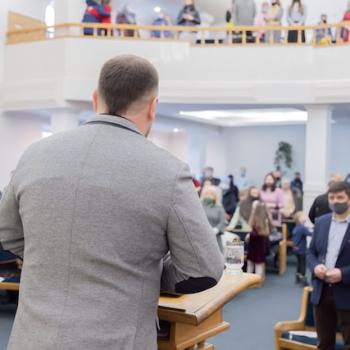
I was in a church class, and we were discussing a controversial issue. Part of the conversation involved some of the relevant Bible passages and the different ways people understand these passages.
For some, the interpretive questions were too much. One person in the class—an older man, and an elder at the church—threw up his hands and said, “It’s inspired!” As if this were a statement to end all conversation.
As in: It’s inspired; therefore it must be taken at its literal face value. No more thinking necessary. No need to engage with the context it was written in or consider how different our context is today.
If I were able to respond, now, to his comment, I might say this: “Yes, it’s inspired…and it’s also complex.”
What does it mean for the Bible to be “inspired”? Or, put another way: To what extent was the Bible written by God, and to what extent was it written by humans? And to the extent that it was “inspired” by God, what does that mean?
The Bible Might Say It, But That Doesn’t Settle Much
Trite sayings like “The Bible says it, I believe it, that settles it” have never quite captured the full picture of what’s going on. To take it part by part:
- “The Bible says it”—what exactly the Bible says is often ambiguous. There are translation issues, transcription issues, textual variants among primary sources. The stories recorded in the gospels, for example, circulated for decades orally before being written down. No doubt they were shaped over time by the communities that circulated them. This does not make them any less true or good—oral tradition is an amazing and powerful thing—but it might give us pause if we find ourselves reading each word literally as if God personally wrote them down on the page.
- “I believe it”—what exactly do we believe? What does it mean to believe the Bible? Even the view that the Bible is our sole source of authority is, in itself, a particular belief born out of a particular kind of Christian tradition. Most expressions of the Christian tradition have had a mix of authority sources—whether the pope, or the reformers, or particular creeds and catechisms, or simply the experience and reason of their leaders. Many thoughtful people would say they believe the words of the Bible—but, like many of my seminary professors, they believe very different things from one another.
- “That settles it”—so many questions of biblical interpretation have never really been settled. Denominations split because of them. (The United Methodist Church is just one recent example.) People disagree about exactly how many Protestant denominations there actually are, but the number is in the thousands. Is anything really settled? If the Bible were as clear as some think it is, the landscape of Christianity would likely look quite different.
The Bible as a Conversation Starter, Not a Conversation Ender
The idea that nothing is actually settled can be disorienting if we have been taught that there is one right way to think, one right way to be in this world. But if we’re open to other possibilities, it can be exciting. It can be hopeful.
It means that when the ways we’ve thought about things are not working—and clearly, as people leave churches in droves, and as churches fracture or dwindle and die, many things are not working—we can reexamine. We can embrace the possibility of change.
I want to be part of communities and conversations where the Bible is a conversation starter, not a conversation ender. I want to read scripture together and see what conversations it opens up as we all weigh in on its words and what they mean for us.
I want to hear how diverse groups of people read scripture now, not just how a couple of overly influential dead white guys read it in centuries past. I want to think together about what the Bible’s stories mean for us today.
Inspiration and Agency
I absolutely believe God speaks through scripture. I also believe that this speaking—and my own listening—can be complicated. It isn’t as straightforward as taking everything as literal instructions written just for me.
There was too much human involvement in scripture’s writing. Too much embeddedness in time and place and culture.
These things make the Bible interesting, beautiful, and wonderful…and human. I don’t think saying that insults God. I think it acknowledges the way God honors and embraces human agency—including human agency in writing the scriptures.
Partnership between God and humans was and is imperfect. Humans bring to table our gifts but also our biases and limitations. The partnership is flawed. But is also good. Good things can come out of it.
We can be inspired by the Bible without needing to believe God spoke every word directly and the human writers only transcribed it. These writers had more agency than that. And, in reading and interpreting scripture now, so do we.
The Bible is inspired, and complex.
For me, taking the Bible seriously doesn’t mean reading it as a literal set of instructions from God. It does mean reading it in community, reading it in context, inviting many different voices into the conversation and exploring together where God might be in it and what it might mean.
















